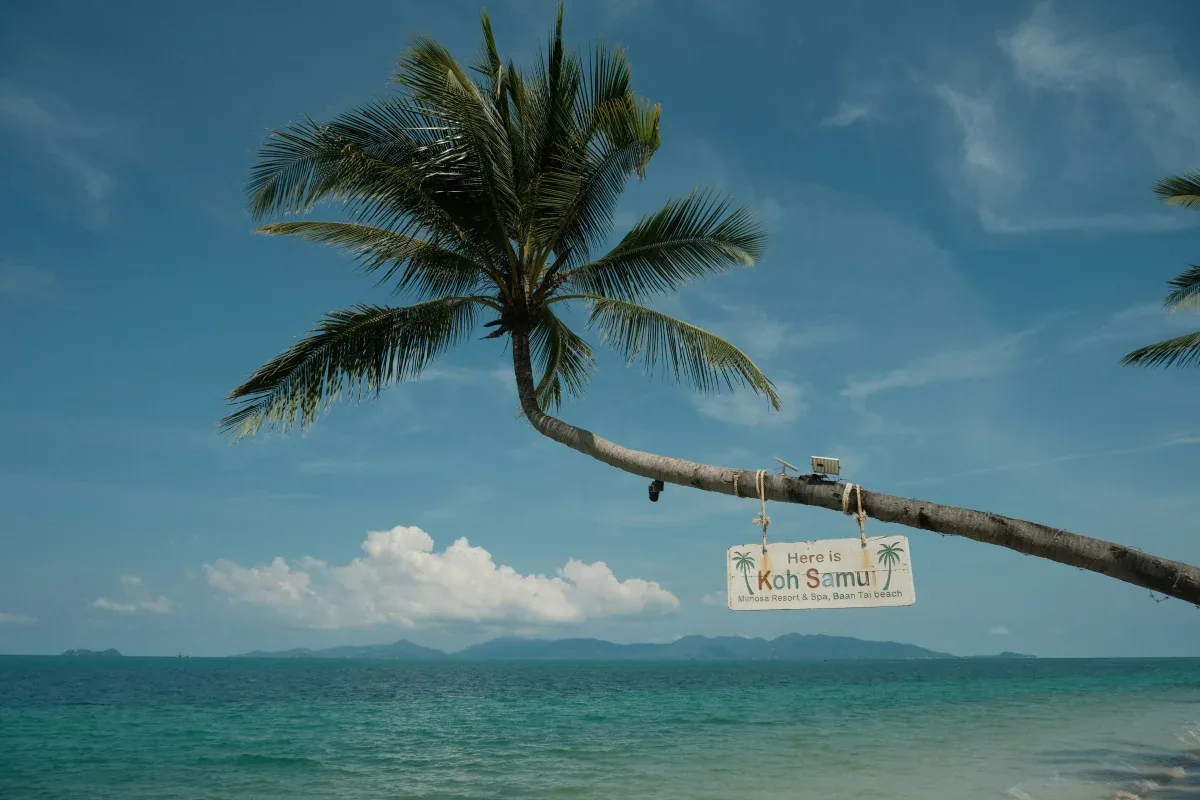
🏝️Koh Samui
Tropical island escape in the Gulf

Tropical island escape in the Gulf
Picture this: It's 7am on a Tuesday, and you're sipping fresh coconut water at a beachfront cafe in Fisherman's Village. Your laptop is open for a morning Zoom call, but you're barefoot in the sand, watching long-tail boats drift past palm-fringed shores. An hour later, you'll drop the kids at an excellent international school, hit a yoga class overlooking the Gulf, and still have time for a proper workday. This isn't a vacation fantasy—it's just Tuesday on Koh Samui.
Koh Samui is Thailand's second-largest island, and it's mastered something many tropical destinations haven't: the art of sophisticated island living. Unlike the full-moon party chaos of nearby Koh Phangan or the backpacker dive scene of Koh Tao, Samui has evolved into a place where you can actually live, not just visit. There are international schools that rival Bangkok's best, a world-class hospital, direct flights to major cities, and an expat community that includes everyone from young families to wellness entrepreneurs to early retirees seeking warmth and ease.
What sets Samui apart isn't just the postcard beaches or year-round warmth—it's the infrastructure that makes daily life work. Bangkok Hospital Samui provides healthcare that would be impressive anywhere, let alone on an island. The International School of Samui and Panyadee British School offer rigorous curricula that let expat kids seamlessly transition back to their home countries. Samui Airport, despite being a tiny outdoor terminal with thatched roofs, connects to Bangkok a dozen times daily, plus regional hubs like Singapore and Hong Kong. You're on an island, yes, but you're not stranded.
"Samui has mastered what many tropical destinations haven't: the art of sophisticated island living where you can actually build a life, not just take a vacation."
The island is roughly circular, about 25 kilometers across, with a ring road that makes navigation straightforward. But where you settle shapes your entire Samui experience. The island has distinct personality zones, each attracting different types of residents.
Bophut, on the north coast, is the expat heartland. Fisherman's Village—a preserved stretch of Chinese shophouses turned boutique hotels and restaurants—epitomizes why people love this area. It's walkable, charming, and sophisticated without being pretentious. The Friday night walking street brings locals and tourists together over grilled seafood and handicrafts. Most importantly, Bophut is close to the airport (ten minutes) and the international schools, making it the default choice for families. Expect to pay 15,000-35,000 THB monthly for anything from a simple apartment to a small house with a pool.
Just east, Choeng Mon offers something quieter and more upscale. The crescent bay here has calm, shallow waters perfect for young children, and the area attracts families willing to pay premium rates (20,000-50,000 THB+) for peace, privacy, and sea views. It's more residential than Bophut—fewer restaurants and shops, but also fewer crowds and more space to breathe.
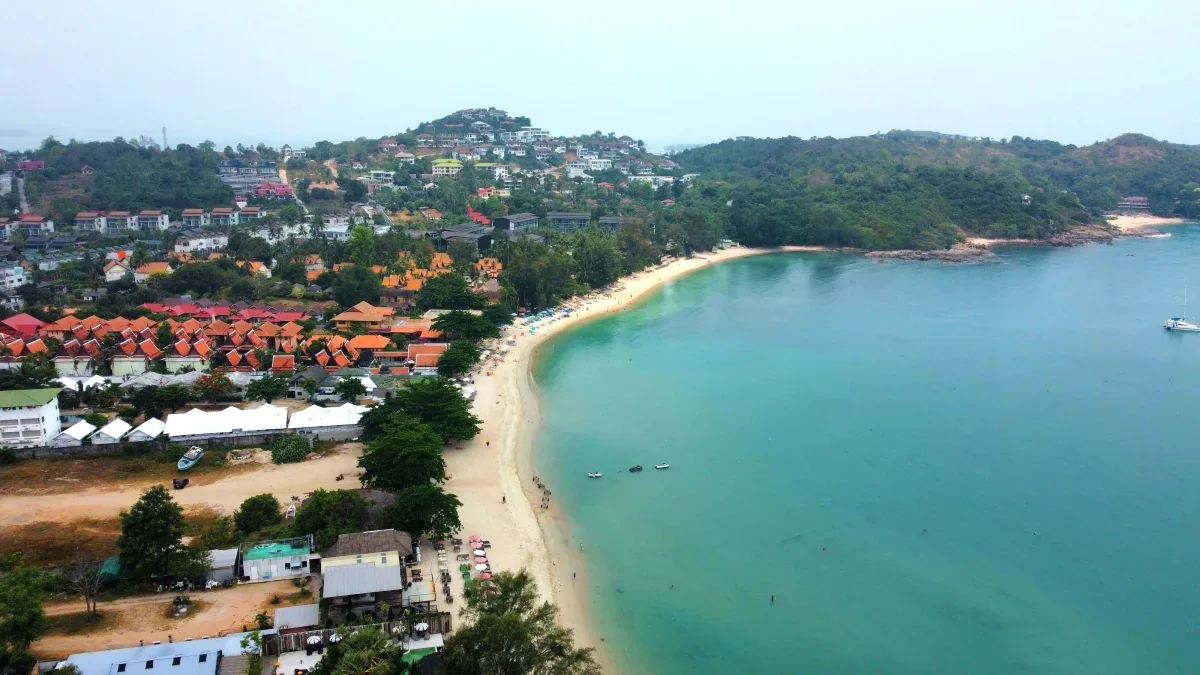
Maenam, stretching along the northern shore west of Bophut, represents the sweet spot for many long-termers. The beach is beautiful—long, gently sloping, with shallow water—and the vibe is distinctly residential rather than touristy. You'll find Thai families picnicking under casuarina trees, morning markets selling fresh seafood, and a growing cluster of cafes and restaurants catering to the expat community. Housing costs less here (12,000-28,000 THB), and you get more space, but you trade some convenience. Maenam feels more authentically local, which is exactly what some people want.
Lamai, the island's second-largest beach town on the southeast coast, has a grittier, more laid-back energy. It's cheaper (10,000-25,000 THB), has good beach access, and enough infrastructure to be comfortable, but it lacks the polish of the north coast. Lamai attracts budget-conscious expats, independent travelers, and people who prefer a rougher edge to their paradise. Some nightlife exists, but nothing like Chaweng's excess. For many long-termers, Lamai offers the best cost-to-convenience ratio on the island.
Living on Samui costs more than Chiang Mai but less than Phuket. Everything that arrives by ferry or plane—which is everything—carries a transportation surcharge. Imported cheese costs more. Craft beer costs more. Building materials for home repairs cost more. You're paying for paradise, yes, but you're also paying for island logistics.
Most expats find they need 50,000-80,000 THB monthly for a comfortable lifestyle. Families in proper villas with pools should budget 80,000-120,000 THB. You can do it cheaper—plenty of people live well on 40,000 THB by renting modestly, cooking at home, and skipping the imported wine—but that requires discipline and local habits. Most newcomers underestimate costs in their first months, lured by cheap pad thai and forgetting to account for electricity (air conditioning runs constantly), scooter rentals, visa runs, and the inevitable "let's get cocktails at sunset" expenses that come with beach living.
The above budget assumes a modest two-bedroom villa, home cooking supplemented by occasional restaurant meals, and a scooter for transport. Upgrade to a sea-view property, eat out regularly, or lease a car, and you'll easily hit 80,000-100,000 THB. Families with children in international schools face additional costs: tuition runs 300,000-600,000 THB annually depending on the school and grade level.
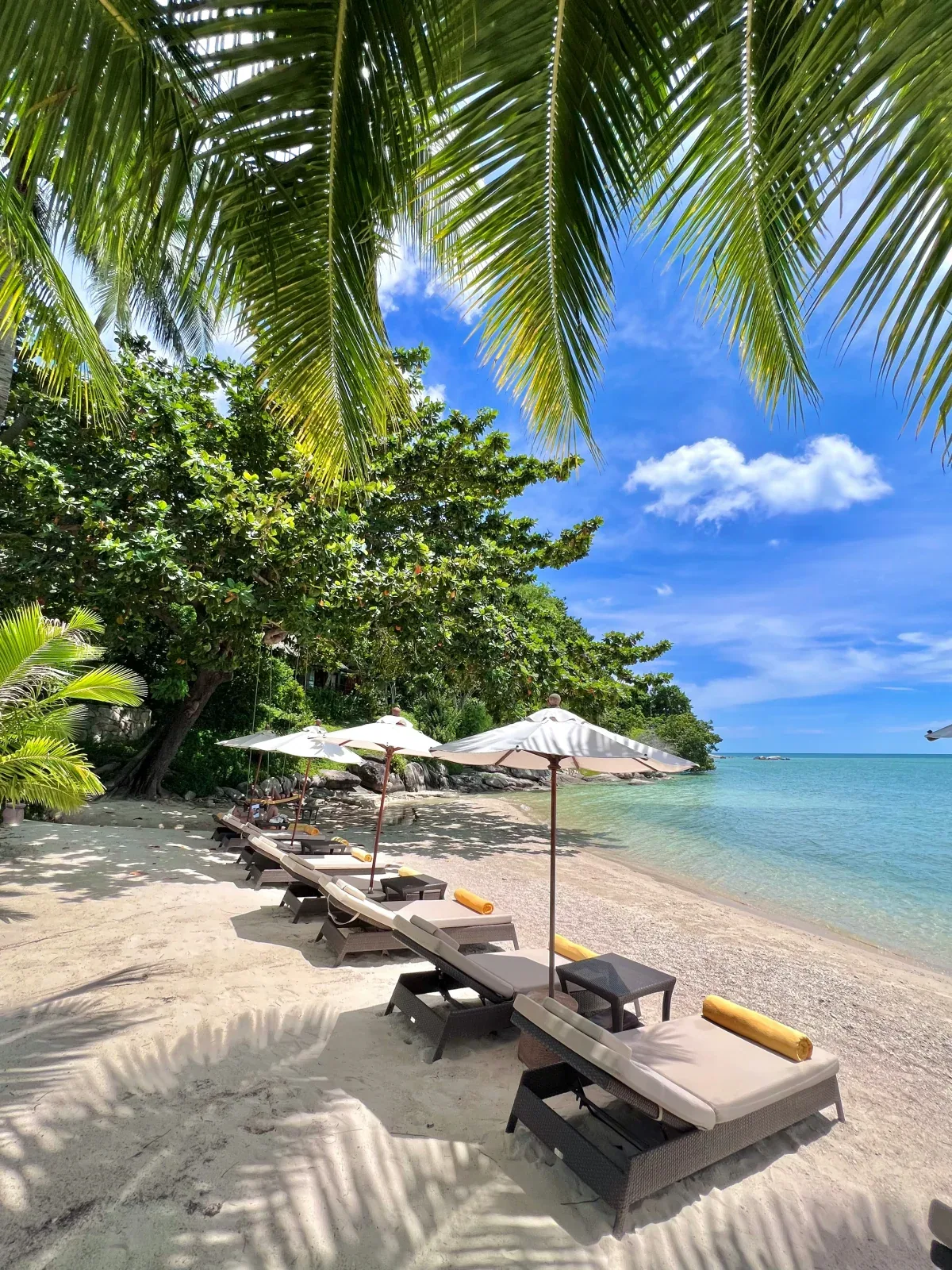
Samui has a peculiar weather pattern that runs opposite to most of Thailand. While Bangkok and Chiang Mai get soaked during the May-October monsoon, Samui stays relatively dry. The island's driest, sunniest months are December through April—perfect beach weather when the rest of Southeast Asia bakes or floods. This inverted seasonality is why Samui became a major destination: when Phuket drowns under monsoon rains, Samui gleams.
But Samui pays for its dry winter with a wet autumn. October through December, particularly November, can bring heavy sustained rainfall. Not the brief afternoon thunderstorms you expect in the tropics—actual gloomy, relentless rain that keeps you indoors for days. Some years November is merely damp; other years it floods roads and cancels ferries. Many long-term expats schedule their home-country visits for November, letting someone else enjoy the rain.
Temperatures stay warm year-round (25-32°C), with humidity that's intense but breezy. The sea breeze makes Samui more bearable than landlocked Thai cities. You'll still run air conditioning at night, and midday heat in April can be punishing, but the island rarely feels oppressively hot the way Bangkok does.
"The inverted seasons mean you're always slightly out of sync with the rest of Thailand—but that's exactly why Samui feels like an escape."
Samui delivers on many promises: stunning natural beauty, wellness-focused culture, sophisticated amenities, and a welcoming expat community. But island life comes with trade-offs that become clearer the longer you stay.
The biggest challenge is the scale. Samui is small. Really small. You can circle the entire island in 90 minutes. After a few months, you'll know every good restaurant, every beach, every shortcut. Some people find this comforting—a contained, manageable world. Others start feeling trapped. The Facebook groups where you once found helpful advice start recycling the same discussions. You see the same faces everywhere. Weekend trips off-island become essential mental health breaks.
Professional opportunities are limited unless you work remotely. Teaching English, managing vacation rentals, running a small tourism business, or working in hospitality—that's most of what's available. The digital nomad visa has brought more remote workers, but if you need a local career, Samui isn't the place.
You need wheels. Public transport barely exists—a few songthaews (converted pickup trucks) run semi-regular routes for 30-100 THB, but they're unreliable and don't go everywhere. Most expats rent scooters (3,000-4,500 THB/month), which work fine for solo mobility but become impractical with kids or when hauling groceries in tropical heat. Families typically lease cars (15,000-20,000 THB/month), trading cost for comfort and safety.
The ring road makes navigation straightforward. You're either on it or connecting to it. Traffic stays manageable except in Chaweng during high season, where beach-bound tourists clog the main strip. Grab and Bolt operate on Samui, but driver availability varies by area and time. Don't assume you can summon a ride like you would in Bangkok—plan ahead or have your own transport.
The airport sits centrally, making it accessible from anywhere in 15-30 minutes—a major advantage over islands like Koh Phangan where getting to the pier is half the journey. Bangkok Airways dominates routes, with multiple daily flights to Bangkok (2,000-4,000 THB round-trip) plus connections to Singapore, Hong Kong, and other regional hubs. The airport itself is charming—open-air, thatched roofs, garden seating—but functionally small. Check-in lines can be chaotic during peak times.
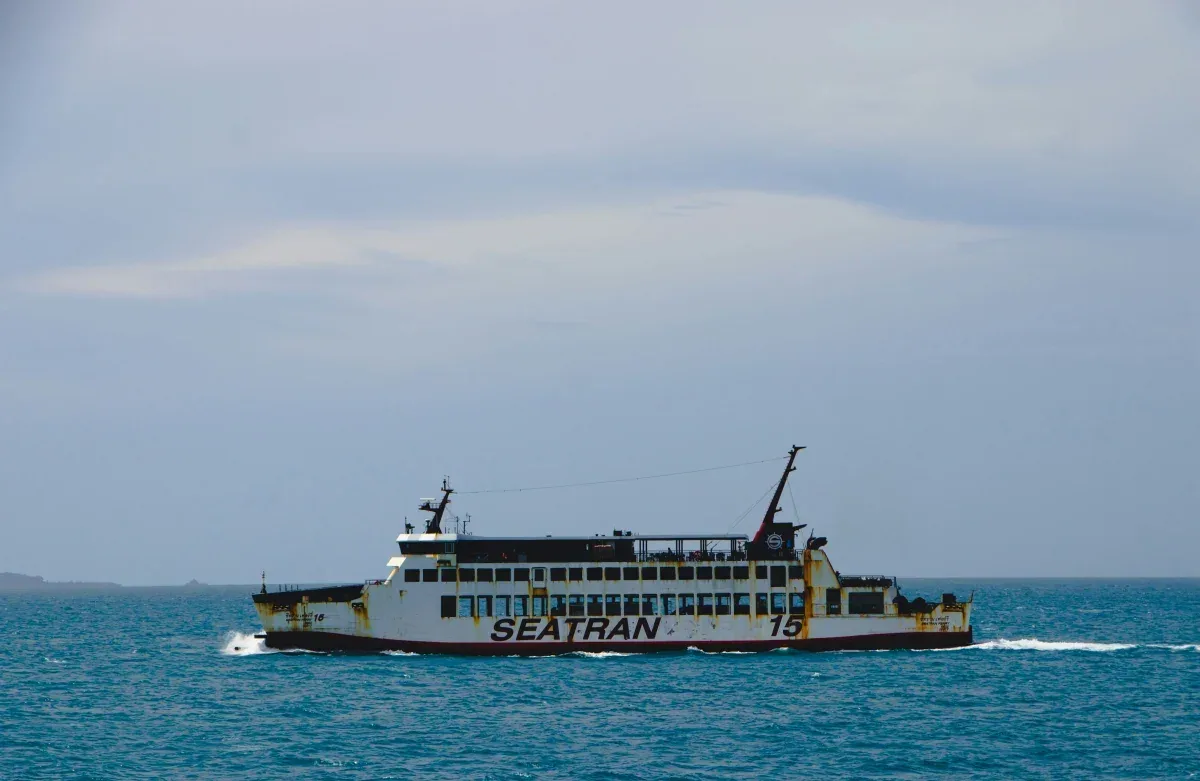
The expat community on Samui is active and welcoming. Facebook groups like "Samui Expats" serve as the island's social bulletin board—housing leads, restaurant recommendations, visa advice, and everything else you'll need. Weekly events abound: Hash House Harriers running groups, international women's clubs, business networking meetups, and family playdates at the beach.
Getting integrated happens naturally here. The island's small enough that you'll keep bumping into the same faces at the market, yoga class, or school pickup. Most newcomers find their circle within weeks.
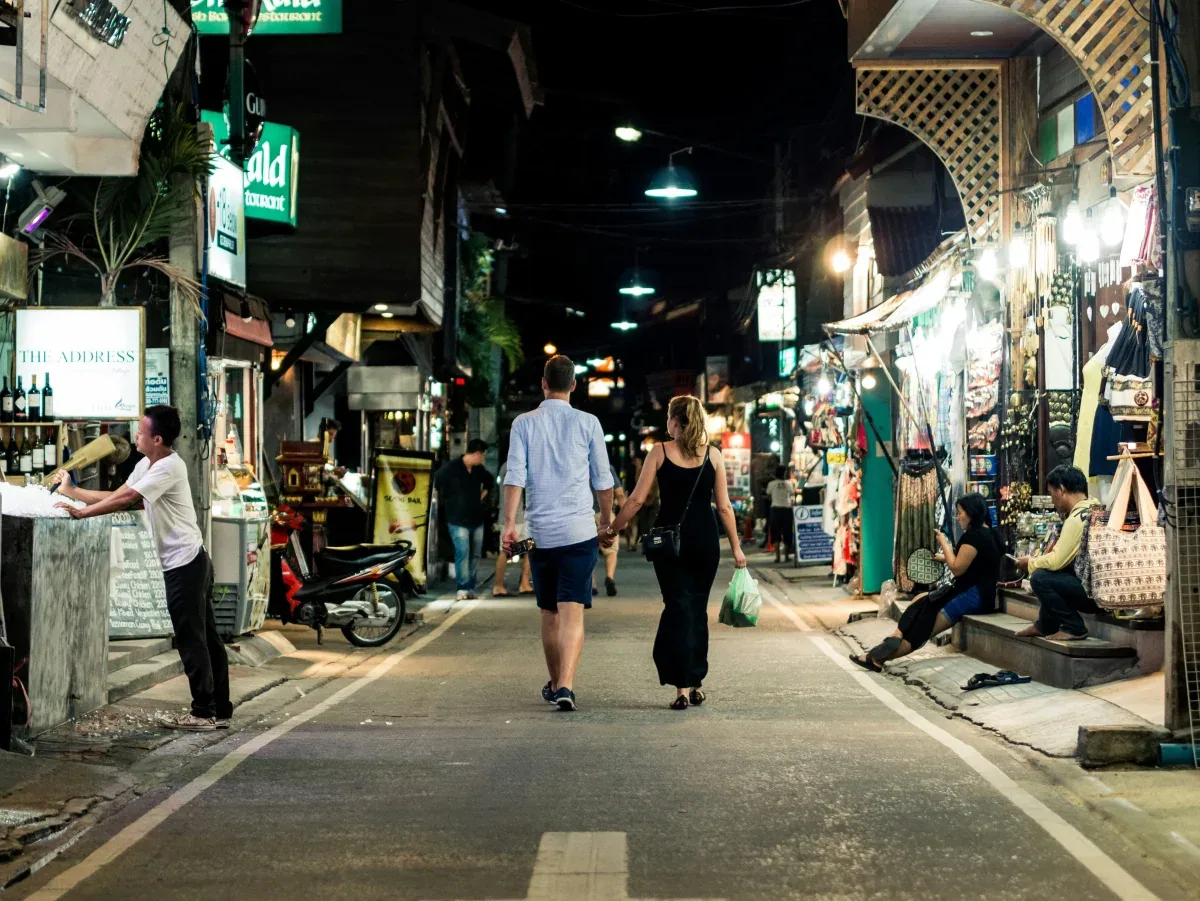
Samui has leaned hard into wellness culture, and it fits. Yoga studios, Muay Thai gyms, fitness centers, and meditation retreats dot the island. Cafes serve açai bowls and kombucha alongside traditional pad thai. Health-conscious expats who want to live actively—not just retire passively—gravitate here. Stand-up paddleboarding at sunrise, diving in crystal-clear bays, snorkeling with sea turtles, cycling the ring road at dawn, island-hopping to Koh Phangan or Koh Tao for weekend adventures—these become routine, not vacation activities.
The dining scene reflects this duality: sophisticated beachfront restaurants serving fresh seafood alongside authentic Thai cuisine and surprisingly good international options. Fisherman's Village, Chaweng Beach Road, and Lamai concentrate most dining and nightlife. Central Festival mall brings familiar Western brands and air-conditioned shopping when you need a break from beach heat. It's not Bangkok's endless variety, but it's far more than most tropical islands offer.
For families, the infrastructure makes a difference. ISS (International School of Samui) and Panyadee British School provide education that keeps kids on track with home-country curricula. Bangkok Hospital Samui offers English-speaking doctors and genuinely excellent care—not "good for an island" care, but genuinely excellent care. These aren't small details; they're what makes long-term island living viable rather than just romantic.
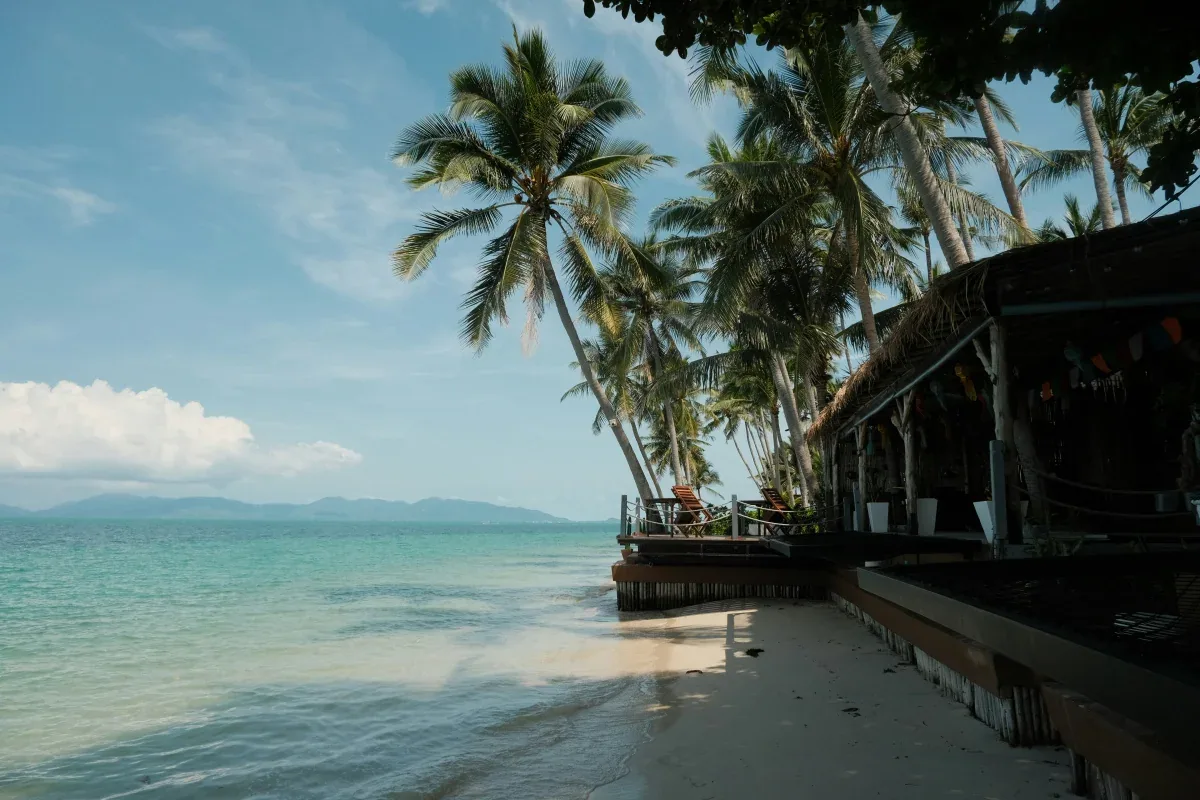
Koh Samui works beautifully for certain people. Families with young children who want safe beaches and excellent schools. Wellness enthusiasts seeking an active, healthy lifestyle without sacrificing comfort. Early retirees or remote workers who value natural beauty and relaxed pace but still need reliable infrastructure. People who find large cities overwhelming but small-town life too limiting.
It's less ideal for others. Career-minded professionals who need local opportunities. People who thrive on endless variety and constant new experiences. Anyone who gets claustrophobic in small communities. Extreme budget travelers (though affordable living is possible with local habits). Hardcore party seekers (Koh Phangan is a ferry ride away for that).
The best advice? Visit for a month before committing. Rent in different areas. Live like a resident, not a tourist. Talk to expats who've been here for years—they'll tell you honestly what works and what wears thin. Samui is genuinely special, but it's not for everyone. When it fits, though, it fits beautifully. That Tuesday morning at the beachfront cafe, laptop open, toes in sand, isn't a fantasy. It's just another workday in paradise. For more guidance on making the move, explore our first week checklist and learn about long-term visa options.
Population
65,000
Average Rent
15,000-30,000 THB
Monthly Budget
50,000-80,000 THB
Temperature
25-32°C
Expat Population
15,000+
Best For
Families, wellness seekers, island lovers
Quick Take
Koh Samui offers sophisticated island living with excellent infrastructure for families and wellness enthusiasts. Beautiful beaches meet modern amenities, but expect island premiums and occasional isolation from mainland Thailand.